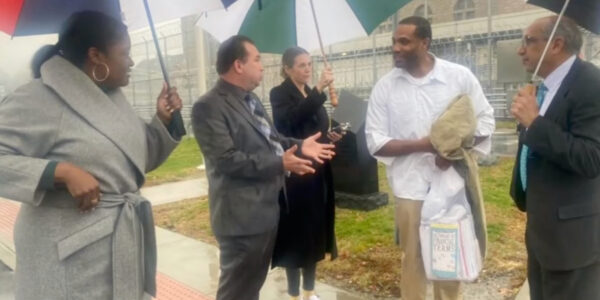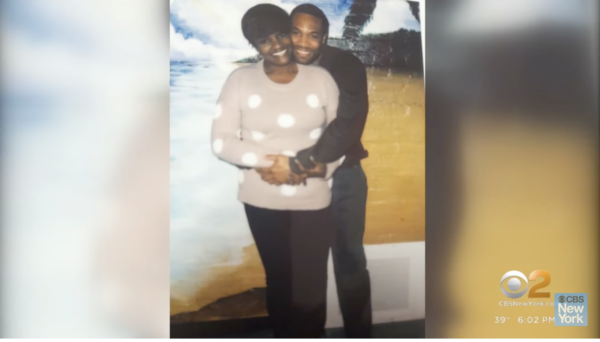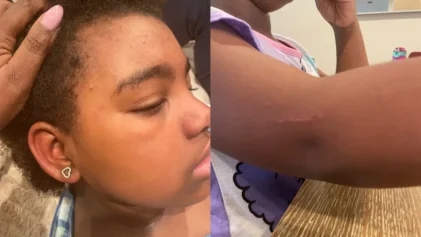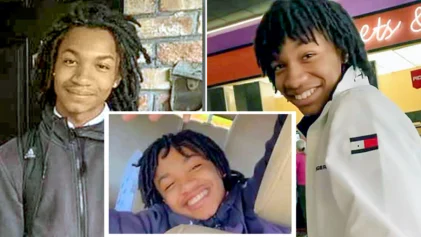A Bronx man has been released from prison after spending almost half of his life behind bars for a crime he says he did not commit.
A judge vacated Andre Brown’s attempted murder convictions on Dec. 5 for a 1999 shooting. He is not completely clear. The borough’s district attorney is considering whether to retry his case.
Brown’s family is excited, especially since the release would come around the holidays, making 2022 the first time since 2000 he was able to spend Christmas with family.

“We were already planning Christmas; this will be an exceptional Christmas,” said his wife, Tameka Brown. “My son doesn’t know the news yet. We are hoping to surprise him.”
The man was released from prison after his legal team worked to prove he had ineffective counsel when he was first convicted at the turn of the century, CBS News reports.
Brown was a college student in the borough of Manhattan Community College when he voluntarily went into a Bronx precinct for questioning about an attempted murder accusation in 1999. He went in five days after the shooting because a woman, who was stuck in traffic near the shooting, identified him as the suspect.
According to court documents, two teenagers, O’Neill Virgo and Shawn Nicholson, were shot and seriously injured by a masked gunman in the Bronx in January 1999. The woman was sure Brown was the shooter, even picking him out in a police line-up.
In March 2000, a judge sentenced the BMCC student to 40 years to life in prison for a crime he maintained he did not commit.
Twenty-two years later and now a free man, Brown said being convicted made him feel hopeless.
“It was just an astronomical, heart-wrenching feeling. I want to say that I lost hope at that moment when they put the handcuffs on me,” Brown recalled.
According to one of his lawyers, Oscar Michelen, who filed the motion to vacate Brown’s conviction in May 2019, the young man believed his life would be over.
He allegedly said to the sentencing judge after his trial, “Do you see what possibly you are taking away from me, my career as a school kid in college?”
“Do you see, Your Honor, actually what you are doing to an innocent man? Could you stand to live with yourself by doing this to an innocent man, Your Honor? This is a very big injustice being done today, Your Honor,” he continued. “For I understand your obligations and duties as a judge of the judicial system, Your Honor, but you are sadly making a grave mistake today for the innocent man that stands before you.”
The 2,500-page motion to vacate, according to Michelen, hinged on the Freedom of Information Law that demanded the prosecution produce “some exculpatory evidence” that was “not turned over.”
It also noted Brown’s then-trial lawyer, who is subsequently disbarred, “did not present a clear defense that would show Andre could not have committed the crime.”
In March, the lawyers presented new evidence to the court that supported the notion that Brown could not have been the shooter seen running that night from the scene because his leg was severely injured.
We have found new evidence, we have medical experts that say he couldn’t physically commit the crime,” Michelen said.
“We have experts in eyewitness identification and ineffectiveness of counsel, who all say he didn’t get a fair trial,” the lawyer said.
Thomas J. Lee, Brown’s trial attorney failed to show Brown’s hospital records at trial. Those records would have revealed the then-college student suffered nerve damage to his right leg, rendering him unable to chase the victim or run away as alleged.
Lee did not subpoena two eyewitnesses to the shooting. One of the witnesses named a different person as the shooter of the two men. The other witness, who was never contacted by the court, also knew why someone else had a motive to shoot the victims, Brown’s new team of lawyers revealed.
The lawyers also revealed to the court that five years after Brown’s conviction his trial lawyer proved to be crooked, pleading guilty to racketeering with the Bonanno Crime Family. He was subsequently disbarred.
Later, Lee was placed in the FBI’s Federal Witness Protection Program because he testified against the heads of one of the five most famous crime families in New York, Bloomberg.com reports.
In 2021, Lee, who plead guilty to his crimes, was able to practice law again in New York — even as Brown sat in jail waiting for his day in court.
His incarceration was hard on the then-young man, an experience he describes as “hell.”
“Hell. Hell. I gave you the strongest word,” he said. “Emphatically hell.”

The lawyer presented 31 exhibits, a 20-page fact affirmation, and a 27-page Memo of Law to start the process of rendering the man, now in his middle age, his freedom.
In March 2020, Bronx Supreme Court Judge David Lewis ruled an evidentiary hearing was warranted in Brown’s case. However, the global pandemic shut down the courts, delaying the hearing for more than a year, the Insider reports.
During the height of COVID-19, some virtual hearings were taking place, but according to New York law, both parties had to consent to participate in the online process.
Prosecutors refused.
Finally, over two years after Lewis ruled Brown should receive a hearing, the judge reviewed the evidence and cited ineffective counsel when he set him free, releasing him on his own recognizance.
While many people over the years have helped him, Brown’s attorney Jeffrey Deskovic played a crucial role in him gaining his freedom. For the lawyer it was personal, and in a case, he was invested empathically.
In 2006, Deskovic was freed from prison after serving 16 years for a crime that he did not commit, winning $8.3 million for his wrongful imprisonment from New York State and Westchester County.
With the money, he founded the Jeffrey Deskovic Foundation for Justice to help other innocent people get out of prison, saying, “What happened to me, it can happen to anybody.”
Later Deskovic went on to get his law degree and became a lawyer with the specific goal of fighting for people like Brown. Brown was Deskovic’s first victory as a lawyer.
“It’s just inspiring to have Jeff next to me in the courtroom because he’s a living example of what people can do once they’re given the opportunity,” said Michelen, who specializes in working with the wrongfully convicted.
Tameka said she never gave up on her husband and waited for him all of these years.
One of the first things he did was to go to dinner with his wife and lawyers and eat to his heart’s delight.
Brown recounted the dinner with joy in his eyes, noting it was nothing like the prison grub he had been eating, day in and day out, for the last two decades.
“I was able to have surf and turf. I didn’t even know how to tell them I wanted the steak. I know all about the lobster tail and just soaking it into the butter. It was just so delicious. It was so transforming in my heart because I was used to a prison dinner,” Brown said.
Brown is not through with the attempted murder allegations, as the Bronx DA is appealing the judge’s ruling and will decide if his office wants to retry the case. Michelen and Deskovic are not very worried, believing the evidence they have presented to the court is strong enough to uphold his innocence.


